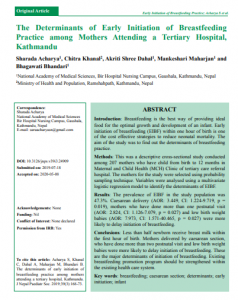
Introduction
Breastfeeding is the best way of providing ideal food for the optimal growth and development of an infant. Early initiation of breastfeeding (EIBF) within one hour of birth is one of the cost effective strategies to reduce neonatal mortality. The aim of the study was to find out the determinants of breastfeeding practice.
Methods
This was a descriptive cross-sectional study conducted among 207 mothers who have child from birth to 12 months in Maternal and Child Health (MCH) Clinic of tertiary care referral hospital. The mothers for the study were selected using probability sampling technique. Variables were analysed using a multivariate logistic regression model to identify the determinants of EIBF.
Results
The prevalence of EIBF in the study population was 47.3%. Caesarean delivery (AOR: 3.449, CI: 1.224-9.719, p = 0.019), mothers who have done more than one postnatal visit (AOR: 2.824, CI: 1.126-7.079, p = 0.027) and low birth weight babies (AOR: 7.973, CI: 1.571-40.465, p = 0.027) were more likely to delay initiation of breastfeeding.
Conclusions
Less than half newborn receive breast milk within the first hour of birth. Mothers delivered by caesarean section, who have done more than two postnatal visit and low birth weight babies were more likely to delay initiation of breastfeeding. These are the major determinants of initiation of breastfeeding. Existing breastfeeding promotion program should be strengthened within the existing health care system.